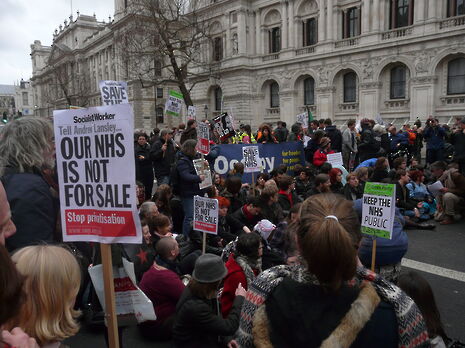The welfare state: Basic act of human decency
Millie Brierley on why the benefits system cannot be underestimated as a social crutch

With the general election fast approaching, it’s all getting a bit exciting. Scary, too, of course. Totally terrifying. But also exciting, I think. After all, it’s a big question we’re being asked: what do you want this country to stand for? And, with every latest promise, policy or pronouncement, we’re having to react and reassess: is this a good thing, or a bad thing? If this happens, will I be better off? Will it make people happier, or will it just make things harder?
If the current political landscape were a cookie (and I haven’t had lunch yet, so trust me: it’s a cookie), we would be constantly being confronted with that age-old question, “Is this a chocolate chip or a sultana?” Most of the time, of course, you can never really be sure until you’ve taken a bite and it’s too late. But sometimes – just sometimes – the odd idea comes along that makes you scream: “SULTANA! THIS IS MOST DEFINITELY A SULTANA! GET THIS COOKIE AND ITS SHRIVELLED EYEBALLS MASQUERADING AS FOOD AWAY FROM ME!”
One such – or so it seems, at least – is the announcement made by David Cameron earlier this week. As the welfare system undergoes its most radical overhaul since the 1940s, with the introduction of the new universal credit payment (the idea behind which being to simplify – and, of course, cut the cost of – the benefits process), a lot is changing. And, according to the Prime Minister, the election of a Conservative government in May could see those with obesity, alcohol or drug problems having their sickness benefit cut if they refuse treatment.
You can see the appeal of this solution, I guess. A quick tick or a cross – help? Yes or no? – and the problem stops being a problem. The books are balanced; everyone is in their right column; and there’s a pleasing glow of organisation and efficiency around the whole situation.
But, of course, a problem doesn’t stop being a problem just because you’ve stopped acknowledging it. If a government washes its hands of an issue, is that job done? Can we all clock off, punch our time cards and go home, satisfied that we’ve put in a hard day’s work? If we stop supporting people struggling with obesity, alcohol abuse or drug addiction, do their problems simply melt away?
Of course not. Personally, I love the notion of a government supporting those who need it. It’s such a simple idea, but it’s also a magical one. Every single benefits payment is politicians going: “You’re having a hard time – let us help you out while you find your feet”.
Or, at least, that’s what it should be. The moment we stop seeing the welfare state as an act of basic human decency – what you do for people when they are struggling, because you can, and you care – and start thinking of it as something to be lorded over people who are already, often, in desperate situations, then, somewhere along the line, something has gone wrong.
Benefits aren’t a carrot, and they aren’t a stick. They’re right and proper, and they’re what people deserve when they – for any number of reasons – cannot provide for themselves. The idea of a welfare state may well be magical, but it would be dangerous to imagine that being on the receiving end felt that way. Regardless of what much of the media might have us believe, the majority of people on benefits are so because they need it. Because, for whatever reason, without that assistance from the government, they wouldn’t be able to get by. There’s no shame in that, of course, but I doubt it always feels like that.
The proposed plans for sickness benefit reduce human beings – and their complex feelings, behaviours and problems – to mere money. Symptomatic of a result-centric approach to politics, with no respect for the processes required to find solutions, they take into account nothing of the personal struggle lying behind problems such as obesity or drug addiction. What the Conservatives have really suggested this week is a means of humiliating people already in desperate circumstances – by reminding them, unnecessarily, who has the power.
So, as the general election approaches, I know what I want this country to stand for. I want it to treat human beings as just that – human beings – not money, or statistics, or ticked boxes. I want it to understand that a person refusing treatment isn’t the same as a person being OK. I want it to stand by people – as I might, one day, need it to stand by me – while they are going through a bad time. And please, please, I don’t want any sultanas.
 Comment / Plastic pubs: the problem with Cambridge alehouses 5 January 2026
Comment / Plastic pubs: the problem with Cambridge alehouses 5 January 2026 News / Cambridge businesses concerned infrastructure delays will hurt growth5 January 2026
News / Cambridge businesses concerned infrastructure delays will hurt growth5 January 2026 News / New movement ‘Cambridge is Chopped’ launched to fight against hate crime7 January 2026
News / New movement ‘Cambridge is Chopped’ launched to fight against hate crime7 January 2026 News / AstraZeneca sues for £32 million over faulty construction at Cambridge Campus31 December 2025
News / AstraZeneca sues for £32 million over faulty construction at Cambridge Campus31 December 2025 News / Uni-linked firms rank among Cambridgeshire’s largest7 January 2026
News / Uni-linked firms rank among Cambridgeshire’s largest7 January 2026








